Bollywood Inquiry June 2019: BHARAT, GAME OVER, KABIR SINGH & ARTICLE 15

Musanna Ahmed is a freelance film critic writing for Film…
Bollywood Inquiry is a monthly column on the biggest new Bollywood movies. Disclaimer: I may not have seen all of the past month’s globally released features.
Bharat (Ali Abbas Zafar)
Bharat is a remake of the 2014 South Korean hit Ode to My Father, an overwrought melodrama but one that made me weep anyway. I was won over by its sweeping presentation of 20th-century Korean history, depicted through the poignant story of a man separated from half of his family during the Korean War, in the middle of the Hungnam Evacuation.
The man rises to the occasion and forges a constructive path in life, participating in major movements of the nation’s post-war years, from working as a gastarbeiter in Germany’s coal mines to fighting in the Vietnam War. Through it all, he falls in love, remains optimistic about reconnecting with his long-lost family members, and never breaks the promise he made to his father to look after the close ones who survived with him. What moved me was the combination of a heartfelt journey and eye-wateringly gorgeous cinematography.
Anyway, it’s a great story that perfectly suits a remake in India, as it allows the storyteller to deliver something simultaneously epic and intimate whilst exploring the history of a nation (which begins at the Partition here) and experiencing it intimately through a single character. The storyteller here is Ali Abbas Zafar and his lead actor is Salman Khan, the brawny comedy-turned-action star and currently the biggest blockbuster guarantor in the subcontinent. This is their third film together following Sultan and Tiger Zinda Hai, two of the highest-grossing films in the country.

Story wise, Bharat does a commendable job at adapting the plot points and contextualising them in India, spicing them up with the flavour of Bollywood. The riots in the Partition set up a tumultuous tragedy of family separation between Gautam Kumar (Jackie Shroff) and his kids Gudiya and Bharat, after they try and get on a departing train and Gudiya falls off, leading their father to chase after her during the violent scenes but not before telling Bharat to take care of everyone. Bharat stays on the train with his mother and younger siblings and heads to his aunt’s imported goods store to start afresh – just as his country does following the geographical divide.
As Bharat grows older, he goes on a Forrest Gump -esque journey of sorts, which makes prophetic sense when you hear that he’s named after the original Sanskrit name for the Indian subcontinent. He entangles himself as a young adult in The Great Russian Circus, a backdrop which justifies the masala film impulse to employ song-and-dance and zippy action sequences of Salman Khan on a stunt bike, and even set up a villain in his rival rider.
Some years later, Bharat joins the Indian migration in the Gulf region during the oil boom, where he falls in love with chief engineer Kumud Raina (Katrina Kaif), who we know he’ll have kids and grow old with as suggested by the non-chronological narrative structure. The spectre of his father occasionally visits Bharat, and he holds out hope for reconnecting with his kid sister one day.
Despite the solid base in remaking Ode to My Father, Bharat turns out to be a very middling experience, undercutting genuine emotion and tension with cheap humour and overdrawn sequences. Zafar refuses to let a conversation or thought end at a reasonable point. My focus on major scenes drifted in and out, as the director felt it was necessary to dress them in thick additional layers, thereby disorienting my engagement of any given moment. This feeling was particularly prominent just before the intermission and at the end of the film – the points where a filmmaker should be holding our attention tight.
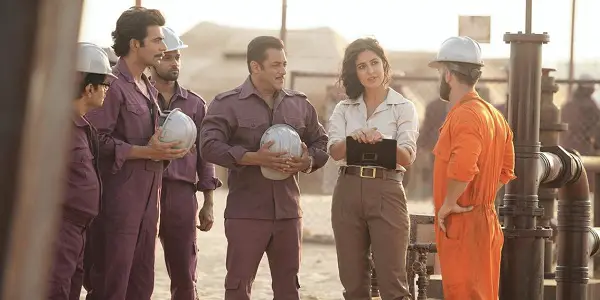
The finale is a whole other can of worms to open: it replicates the ending of the original film but follows up with an action scene that plays like an insecurity on behalf of Khan – the mighty star who won’t allow his movie to finish with a sustained act of vulnerability.
What further affects Khan’s performance is, in his scenes as old man Bharat (of which there are several considering they form the wraparound narrative), ADR is used 100% of the time. His voice clearly wasn’t gravelly enough in the live shoot, so he re-records lines to the point that it sounds like an actual senior actor took over for him in the booth.
Even if it is really the actor himself, everyone else sounds like they’re captured on location whilst he’s recording his dialogue in a studio. I could forgive the chasm between non-diegetic voice and diegetic voice when Brad Dourif voiced Chucky the doll but for a human character it’s too distracting and lends an undesirable artificiality to his performance.
But to end on a nicer note, I can’t close my review without forgetting to mention that Bharat has the most enjoyably ridiculous pirate hostage sequence ever. It had me wheezing.
Game Over (Ashwin Saravanan)
Taapsee Pannu has had a mercurial rise in Hindi cinema following her breakthrough performance in legal thriller Pink but day-one fans have been eagerly awaiting her return to South India, where she began her career making films in Telugu and Tamil. She brings her A-game to Game Over, a Tamil-Telugu thriller that isn’t as committed as its star as it actively undermines her tense performance with unsatisfying technical and narrative choices.
We follow wheelchaired video game developer Swapna (Pannu), nyctophobic and suffering from PTSD, in a brutal cat-and-mouse scenario with a home invader. In the ensuing battle, she must fight her own fear of the dark as well as the tangible threat pervading her house. Whilst Game Over doesn’t entirely succeed, at least it presents itself as something different from the usual multiplex fare in India: no-nonsense, unsparingly violent, dark, disturbing, and – most unusually – only 100 minutes long.

This psychological thriller takes a very heavy-handed approach to the video game concept. Many glaring elements, beginning with Swapna getting a tattoo on her wrist of her development company’s logo. Then there’s the use of VR for therapy, which seems far too much for someone as traumatised as her to undertake. The lack of progress she makes with her psychiatrist is really just a convenient plot device to get the ball rolling on the home invasion scenario.
The mise-en-scene overflows with game references, tons of posters in her household reflecting her addiction. The narrative structure resembles a video game itself; when she gets killed, she respawns with renewed knowledge of the threat and one less wrist tattoo (which inexplicably multiplies beforehand) to count down her lives left. Death is a key component of the storytelling but one of the prominent posters reads “gamers don’t die, we respawn” and this foreshadowing only mitigates the tension.
I came out of the cinema conscious if my hearing was the same level as it was when I entered, for the music is blaringly overwrought – ear-splitting at times. I could hear the composer Ron Ethan Yohann screaming “feel me!” in his attempt to score the film with a miserable and murky Silent Hill -esque ambience. Game Over is atmospheric only because I was frightened at how loud it was getting – more so than what was happening on screen – and the shame is that the superfluity of the music undercuts the palpable anxiety Pannu brings to put the audience in Swapna’s shoes.

It’s kind of a shame that at only 100 minutes, the running time can be felt. I would attribute that to a thin concept that’s been stretched to feature length, taking far too long to really drum up excitement. The best part of the movie is the opening sequence, which is a brilliantly tense short film in itself about a stalking killer, serving as a prelude to Swapna’s story. It reinforces my previous point about the strain Game Over has on its audience’s attention.
Game Over scores points for daring to be different from the average mainstream Indian thriller but overall it isn’t worth playing.
Kabir Singh (Sandeep Vanga)
Kabir Singh is a Hindi remake of the blockbuster Telugu film Arjun Reddy. I haven’t seen the original film but after seeing this remake I’m not sure I want to, unless I become morbidly curious to see how a sympathetic view of misogyny and toxic masculinity was so successful and warranted a rehash for another market.
Frankly, I’m shocked that Kabir Singh is not written by Max Landis. This romantic drama / horror movie follows the title character (played by Shahid Kapoor), a house surgeon at the Delhi Institute of Medical Sciences with an exasperating temper that lands him in hot water following a brawl during a soccer match. The dean tells Kabir to either apologise or leave the institute and, as he mulls on it, a group of fresh female students walk on by. One of them is singled out by his gaze.
That woman is Preeti Sikka (Kiara Advani), whose personal information is swiftly scouted by Kabir’s friend Shiva (Soham Majumdar). An outrageous scene follows as Kabir and Shiva enter her class and Kabir declares that Preeti is exclusive to him now, threatening the male castmates if they show any interest in her. The script doesn’t give her a chance to speak out, nor does it give her any agency at any point, as the male character is control of both of their destinies.
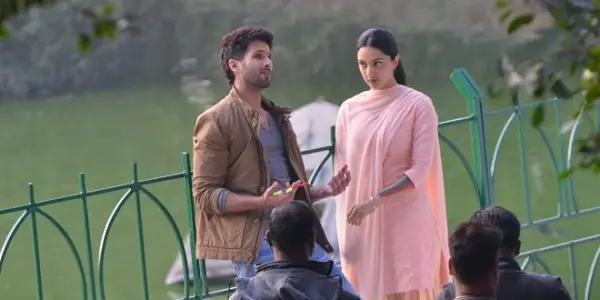
Kabir’s sociopathy and narcissism is perpetual, even when writer-director Sandeep Vanga thinks he’s being cute; there’s a moment that intends to be romantic – but is really rather alarming given what we’ve seen – when Preeti questions what Kabir likes about her and he responds, “I like the way you breathe.”
The months pass and their relationship intensifies despite his persona, but at least her father sees the red flags. Mr Sikka (Anurag Arora) refuses to let his daughter marry such a toxic guy, which exacerbates Kabir’s anger as he slaps his girlfriend and tells her she must make a decision between him or her own family within the next few hours. Considering the director continually sticks by his leading character’s side, it’s disgustingly unsurprising that Preeti runs back to Kabir at this point.
But by the time Preeti reaches Kabir, he’s blacked himself out under the influence of morphine and regains consciousness a couple of days later to discover that she’s been forced to marry someone from the same caste. So, what does Kabir do? He transforms into a self-destructive douche: drinking, smoking, swearing, engaging in one-night-stands and no longer caring about health and hygiene, gaining a skinny-fat physique and growing out his shaggy hair.
His record as a surgeon gives him a job at a private hospital, where he violates all professional ethics, including crossing the line with patients such as an actress who finds his temperament attractive. Vanga seems to enjoy making the least sympathetic individual possible and somehow expects us to root for him, giving Kabir a shot at redemption in the third act. I felt like I was supposed to feel sorry for the protagonist by virtue of his profession and his medical talents, but I just felt sorry for the colleagues in his pernicious presence.
Shahid Kapoor has received praise for his role and he’s certainly great at eliciting strong emotions out of us, completely committing to the “alpha-male who feels territorial entitlement”, as he himself has described the character. I can imagine the sinister shortlist of people he studied for the role includes Ted Bundy and XXXTentacion, the latter whose reports of domestic abuse are recalled in an early scene where Kabir holds a knife towards a girl’s mid-section and demands her to undress. He conjures the spirit of Commander Fred Waterford for the scene where he claims possession of Preeti in the classroom, and the film in turn takes us one step closer to the dystopia of The Handmaid’s Tale.
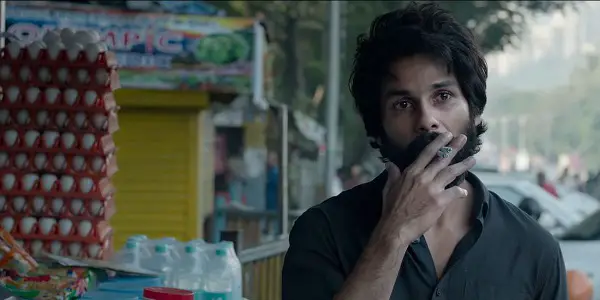
Kapoor ought to speak up about the treatment of his character, as the film glorifies Kabir’s actions, or how his leading lady never gets to make her own decisions. I find that in these types of film where the actress is robbed of any characterisation, critics and audiences can at least have some sort of response about the actress. For example, to say that she shows great potential or that she’s a promising performer who could do amazing with a better script etc.
But, here, it’s impossible to judge Kiara Advani’s performance because she doesn’t get to do anything. Not a single memorable moment or line of dialogue is bestowed upon Preeti, and Advani is permitted to exercise her facial muscles for precisely two minutes in total.
Beyond the irresponsible storytelling, this 172-minute feature is simply a slog. For the longest time, it’s painfully slow, boring and aimless – the thought of “where is this going” crossed my mind for all the reasons a filmmaker wouldn’t want to know. Plus, it’s so sloppily constructed, playing like a rough cut with embarrassingly bad image sequencing, awkward transitions and erratic sound editing.
Kabir Singh is an ugly, unforgivable ode to misogyny that reinforces every argument surrounding toxic masculinity, featuring a horrendous, self-sabotaging protagonist who doesn’t deserve your pity or your time.
Article 15 (Anubav Sinha)
Finally, a great movie about the outdated social hierarchy that is the Indian caste system. And, finally, a movie that breaks the streak of disposable mainstream Hindi cinema over the past couple of months.
This Mississippi Burning -esque thriller follows a batch of the Indian Police Service, led by officer Ayan Ranjan (Ayushmann Khurrana), on an assignment in the fictional lower socio-economic village of Laalgaon wherein two teenage girls have been gang raped and one other has gone missing. This grim story is washed off any colour – literally. Limited colour palettes are applied to each frame to keep it as visually gloomy as possible
The film takes its title from the Indian Constitution – article 15 prohibits discrimination on grounds of religion, race, caste, sex or place of birth – which is cited by Ranjan as he uncovers layers of bigotry against the Dalit population (the lowest ranking caste) within his own team during the investigation.
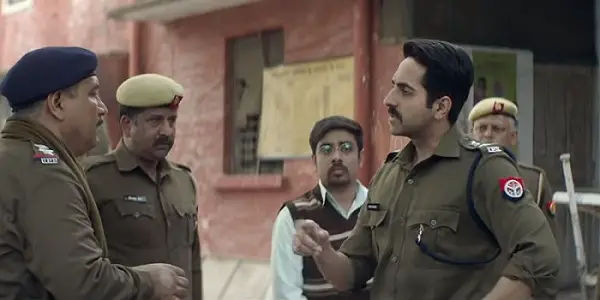
There’s a great scene where Ranjan speaks to his fellow officers and takes turn to ask them one by one about their caste. They enthusiastically respond with pride and prejudice: they speak about being higher up on the social ladder than the citizens of Laalgaon, how they must refuse to eat food given by someone of a lower caste (which actually includes a few of their own colleagues), the minute differences between different titles within the same pecking order, etc. After gritting his teeth whilst listening to the haughtiness, as they prove to be more keen to show off their ranking than examine the crimes, the officer snaps and says “What the f*ck is going on here!”
Ayan Ranjan is fed up, fed up with the lack of care for two dead girls and a missing one, fed up that the caste system clouds the judgement from his team of officers. “This mess is ancient”, he tells his wife Aditi (Isha Talwar) when referring to the motive behind the violent and sexual crimes. “Staying neutral when a fire’s burning is standing with the ones who lit it”, he tells his superior.
He’s the only one with any self-awareness, remarking to Aditi, “They look at us as if the British have returned”, when describing the looks he receives from the Dalits. The colonialism parallels certainly exist considering the de jure rights of the villagers versus their de facto treatment by those in power – i.e., these callous authorities.
For its central narrative thread, Article 15 takes inspiration from real events, notably the 2014 Badaun gang rape allegations and the 2016 Una flogging incident (where a Dalit family was assaulted under the pretext of cow protection) to explore police corruption and casteism within the nation. It’s quite plot-driven in the murder mystery but the social and political themes come through characterisation, conveying the perils of old-world ideologies.
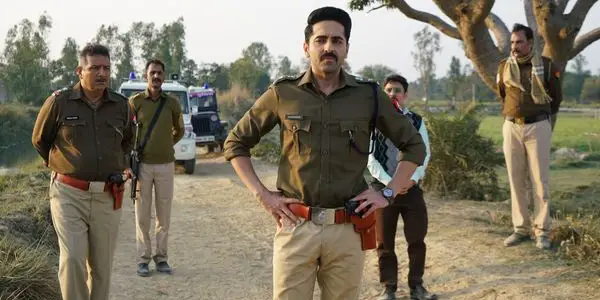
Admittedly, Anubav Sinha’s pen doesn’t have a delicate touch, avoiding grey areas when writing his characters’ dialogues, broadly drawing Ranjan as the opposite to his fellow cops, the portly Inspector Bhramadatt (Manoj Pahwa) and the distrustful Inspector Jatav (Kumud Mishra). Bhramadatt’s thickly villainous motivations and on-the-nose dialogue render him a little cartoonish in a film that’s otherwise strongly grounded in reality.
However, other supporting characters have nuance, namely Gaura (Sayani Gupta), a relative of the three young girls, and her partner Nishaad (Mohammed Zeeshan Ayyyub), whose rebel activities as a leader of the Dalits are sensitively depicted. The director carefully navigates the power dynamic of the oppressed and the oppressor in regards to violence and fighting back, and guides Gupta and Ayyub to scene-stealing, hard-hitting performances.
Ayushmann Khurrana debuted in the film industry just seven years ago yet he’s got a filmography a lot of actors would kill for, sustaining a hot streak of picking amazing, varied projects but, more significantly, delivering phenomenal performances in each of them. There’s no exception here. Article 15 is an arresting crime thriller that provides a sharp criticism of an ancient social system and its dangerous embedment within modern India.
And that concludes the June 2019 edition of Bollywood Inquiry! In July I’m most looking forward to seeing Super 30, a biopic of educationalist and mathematician Anand Kumar, and Judgementall Hai Kya, which I’ve been anticipating for a long, long time because of the great talents of its lead actors and the cryptic plot details which I still can’t decipher from the trailer. Watch it below!
Which Bollywood films are you looking forward to this year or have enjoyed so far? Let us know in the comments.
Does content like this matter to you?
Become a Member and support film journalism. Unlock access to all of Film Inquiry`s great articles. Join a community of like-minded readers who are passionate about cinema - get access to our private members Network, give back to independent filmmakers, and more.
Musanna Ahmed is a freelance film critic writing for Film Inquiry, The Movie Waffler and The Upcoming. His taste in film knows no boundaries.













